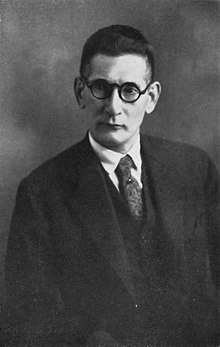Ōkawa Shūmei
Ōkawa Shūmei ( Japanese. 大川 周 明 ; * December 6, 1886 in Sakata , Yamagata Prefecture , Japan ; † December 24, 1957 ) was a nationalist Japanese writer and political philosopher and advocate of the Pan-Asian movement . His writings inspired many right-wing Japanese groups in the 1930s.
Life
In 1911 Ōkawa graduated from the Imperial University of Tokyo in philosophy . Soon he became a defender of the ideas of a famous contemporary nationalist, Kita Ikki , who advocated social Darwinian theses in favor of Japanese imperialism . On January 8, 1919, Ōkawa and Kita and like-minded people founded the influential organization Yuzonsha (Society for the Preservation of the Nation ). Through its communication organ , the magazine Otakebi (battle cry), the Yuzonsha propagated a political return to the simpler, military values of feudal Japan, as well as the establishment of a national-socialist government. Yuzonsha won an immense number of sympathizers, especially among the Japanese military.
After a short time, however, Ōkawa fell out with Kita and from 1924 published his own magazine, Nippon (Japan). In it he pleaded for a Japanese military government and the expansion of the Japanese empire up to and including Manchuria . In 1929 he was appointed by the Japanese government to chair the new East Asian Economic Archives ( 東 亜 経 済 調査 局 , Tōa keizai chōsa kyoku ) of the South Manchurian Railway and as a special lecturer at the military academies of the Imperial Japanese Army and the Imperial Japanese Navy .
In the spring of 1931, Ōkawa was involved in an attempted coup with a group of young army officers . The attempt failed, but it was the first direct attack by the Japanese right-wing extremists against their own government. Another unsuccessful coup followed in October of the same year. Ōkawa was also involved in the assassination attempt on May 15, 1932 against the then Prime Minister of Japan , Inukai Tsuyoshi . Ōkawa was then arrested and sentenced to nine years in prison. In 1937 he was released on parole.
Two years after his release, Ōkawa resumed his previous position in the East Asian Economic Archives. At the same time he was rector of a special faculty at the Tokyo Hōsei University and responsible for the implementation of a program developed there for the systematic national indoctrination of the Japanese population.
In the Tokyo trials of the Japanese war criminals of World War II , Ōkawa was the only civilian charged with crimes against peace . On the first day of the trial, he initially burst into tears in front of the camera and had to be prevented from undressing. Finally he hit Tōjō Hideki , who was sitting in front of him, on the head. Ōkawa's behavior was interpreted as a nervous breakdown and he was led out of the hall. The lawsuits against him were dropped because of mental insanity. Ōkawa was then sent to a mental hospital. In 1948, a week after the trials ended, the bouts of mental confusion ceased. He is discharged completely healed.
Ōkawa devoted the last years of his life to literature, including a translation of the Koran into Japanese completed in 1950 , which was to be his last major contribution to Japanese Islamic studies .
Web links
- Takeuchi Yoshimi: Profile of Asian Minded Man x: Okawa Shumei - English, PDF
- Prof. Dr. Selçuk Esenbel, lecturer at Bosporus University: " Japan's Global Claim to Asia and the World of Islam: Transnational Nationalism and World Power, 1900–1945 ( Memento from December 5, 2004 in the Internet Archive )" - English
Individual evidence
- ↑ "Death by haging" - Japan's Nuremberg trials, documentation, Arte , archived copy ( Memento of 9 August 2018 in the Internet Archive ), from 51:47, Accessed 13 August 2018 20:25
| personal data | |
|---|---|
| SURNAME | Ōkawa, Shūmei |
| ALTERNATIVE NAMES | 大川 周 明 (Japanese) |
| BRIEF DESCRIPTION | nationalist Japanese writer |
| DATE OF BIRTH | December 6, 1886 |
| PLACE OF BIRTH | Sakata , Yamagata Prefecture , Japan |
| DATE OF DEATH | December 24, 1957 |

